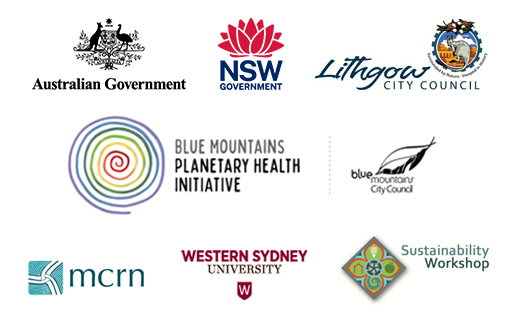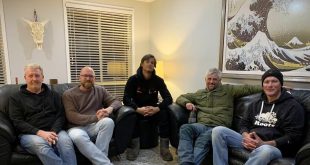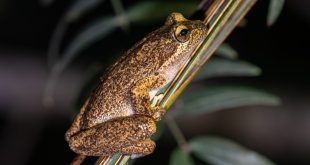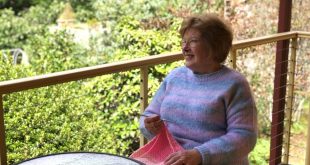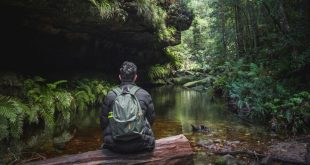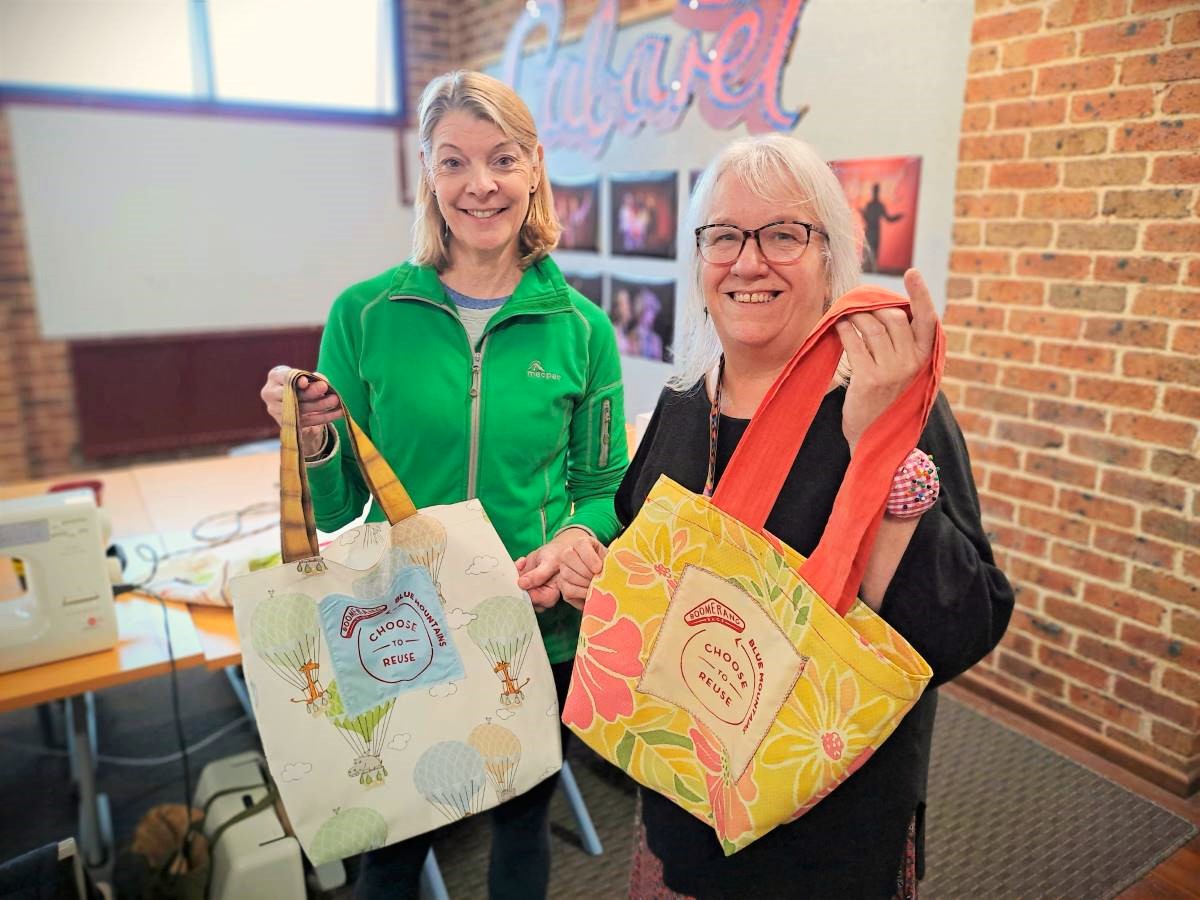
Alison Cameron and Maria De Luca: dedicated volunteers at Boomerang Bags Blue Mountains.
Story and photos by Belle Butler
Boomerang Bags Blue Mountains is part of a global, grassroots movement replacing single-use plastic bags with sustainable recycled fabric alternatives: one sewing bee at a time. The volunteers were hard at work when Belle Butler visited the group to find out more.
Key Points:
- Single-use plastic bags and textile waste are two major environmental problems being tackled by grassroots movement, Boomerang Bags.
- Boomerang Bags Blue Mountains meets at Korowal School on the first Saturday of the month to turn discarded fabric into usable, reusable carry bags.
- The monthly sewing bees are a great way to learn how to sew, make friends and do something for the community and the environment.
Ever been to the shops and realised you’d left your bags at home? This is usually the moment I find myself walking out the shop doors with every pocket overfilled, and my teeth acting as a third set of fingers, just so that I can avoid the plastic bag that was offered to me. In this world in which it is difficult to make consistently pro-environmental choices, a group of Blue Mountains residents is working hard to make one choice a little bit easier.
On the first Saturday of every month, long-standing volunteers and newbies gather at Korowal School in Hazelbrook to sew re-usable bags out of recycled fabric for umbrella-initiative, Boomerang Bags. “We are tackling two problems at once: plastic bags and textile waste,” said Maria De Luca, who joined the local initiative in 2017 and became the group’s coordinator in 2019.
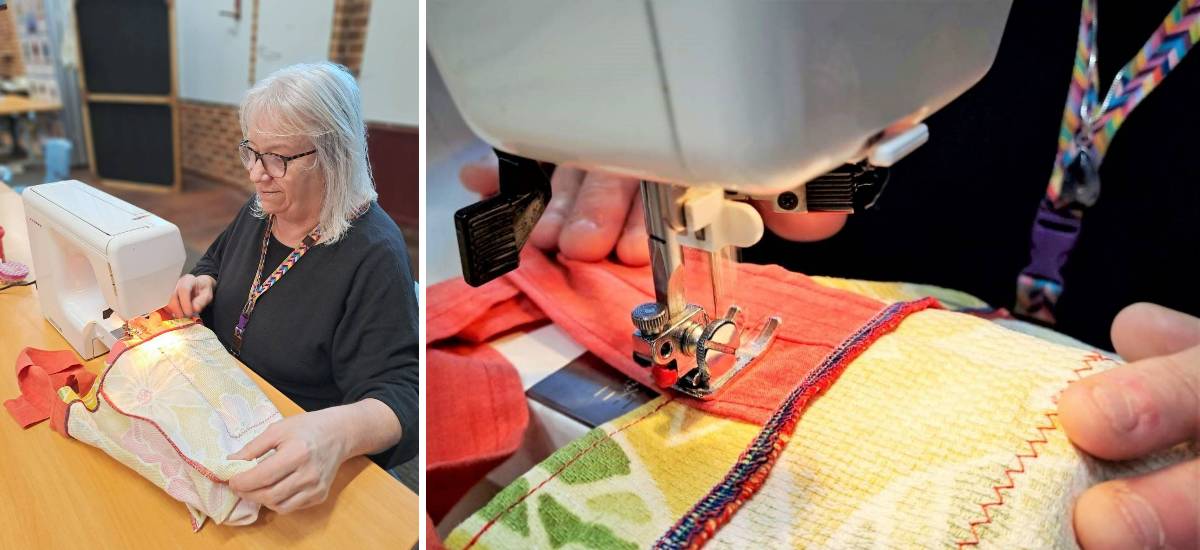
Maria De Luca happily hard at work.
Single-use plastic bags are petrochemical products designed to be used once and then thrown away. From production to disposal, their lifecycle has a significant and lasting impact on the environment, contributing to greenhouse gases and often ending up in the ocean where they kill wildlife and take many years to break down. Meanwhile, the textile industry is responsible for 92 million tonnes of waste globally each year.
Founders of the original Boomerang Bags in Burleigh Heads, Jordyn De Boer and Tania Potts, realised that by diverting textile waste from landfill and giving it another life in the shape of a bag, they could also drastically reduce plastic bag waste. Putting a call out to friends, family and community they gathered donations of recycled fabric and mobilised volunteers to turn that fabric into bags. Community sewing bees were formed and so began what is now a worldwide initiative that has diverted an estimated 180,000 kilograms of waste from landfill since its inception in 2013.
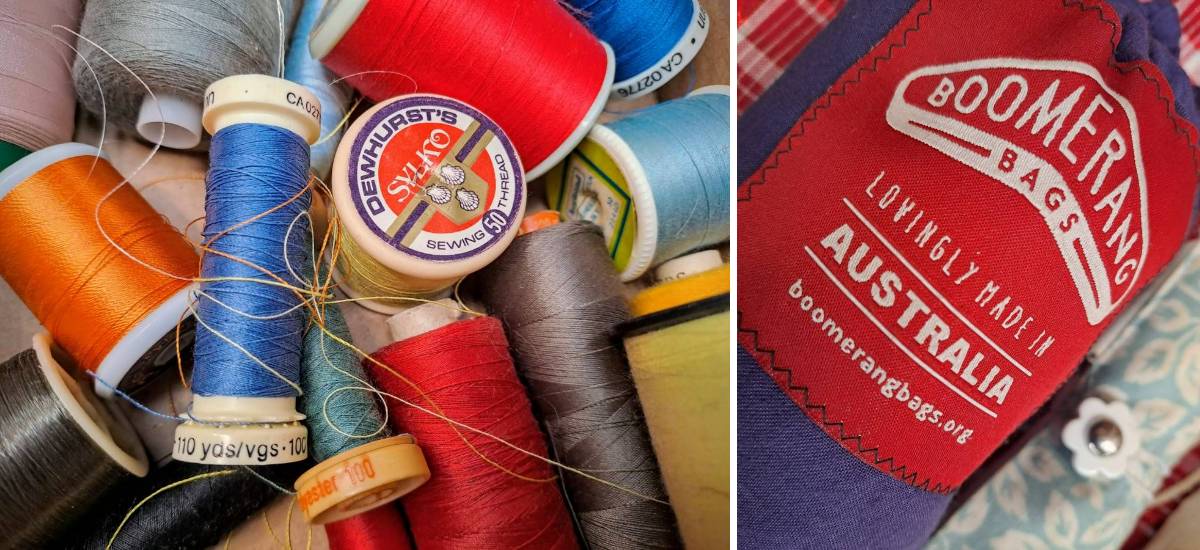
Tools of the trade and labels used to identify which region the bags were made in.
Boomerang Bags now has over 1,100 volunteer communities around the world, including the Blue Mountains group, which supplies bags to the Cancer Wellness Support Op Shop in North Katoomba, Terry White Chemmart Wentworth Falls and the Food Co-op in Katoomba. The Blue Mountains group is hoping to supply more shops as they enlist more volunteers.
“Boomerang Bags Blue Mountains is about getting together, making friends, socialising and doing something for the environment all at the same time… and feeling good about it!” – Maria De Luca
She pointed out that Boomerang Bags takes a nuanced approach to the carry-bag problem, noting that other alternatives such as paper bags or newly made re-usable bags have their own negative impacts on the environment. According to the UN Environment Programme, “Paper bags contribute less to the impacts of littering but in most cases have a larger impact on the climate, eutrophication and acidification.” Newly made re-usable bags may also have significant production, transportation, and disposal impacts on the environment.
Using, and importantly reusing (as many times as possible), a bag made locally from diverted textile waste drastically reduces all of these environmental impacts.
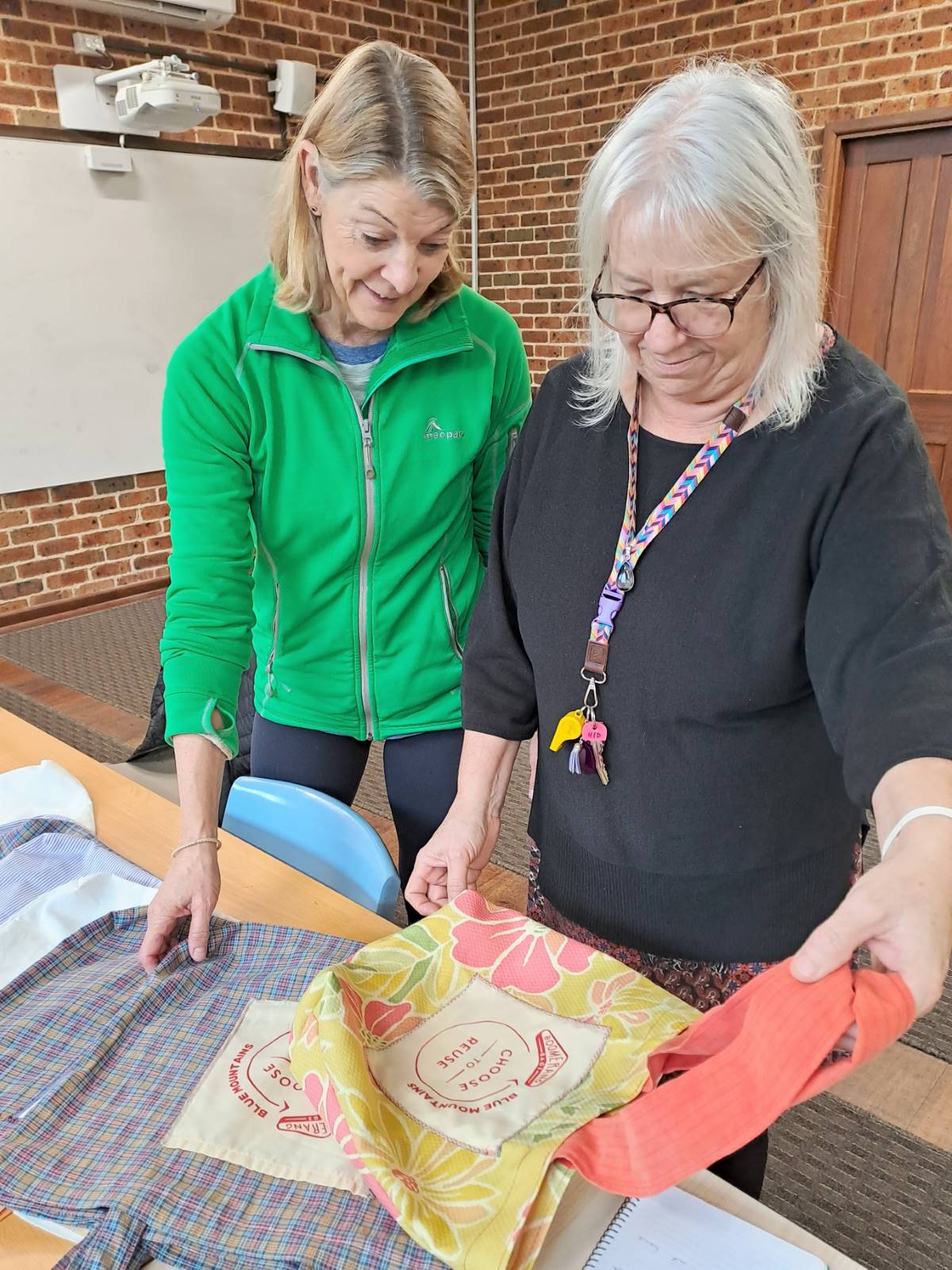
Alison and Maria admiring the various fabrics donated to the group.
While the plastic bag is a classic symbol of a throw-away culture that has become largely accepted and hard to escape, the ‘Boomerang Bag’ may be seen as a symbol of sustainable culture that embraces forgotten skills and old ways.
Alison Cameron, who joined the group in 2019 because she loved to sew and wanted to do something for the community and the environment, commented on the changes she has observed in her lifetime: “All this has been introduced within our lives. We used to use cloth napkins, we only had one doll, etc. Then things were introduced to make life ‘better,’ and now at this end of our lives we are trying to return to the old ways.”
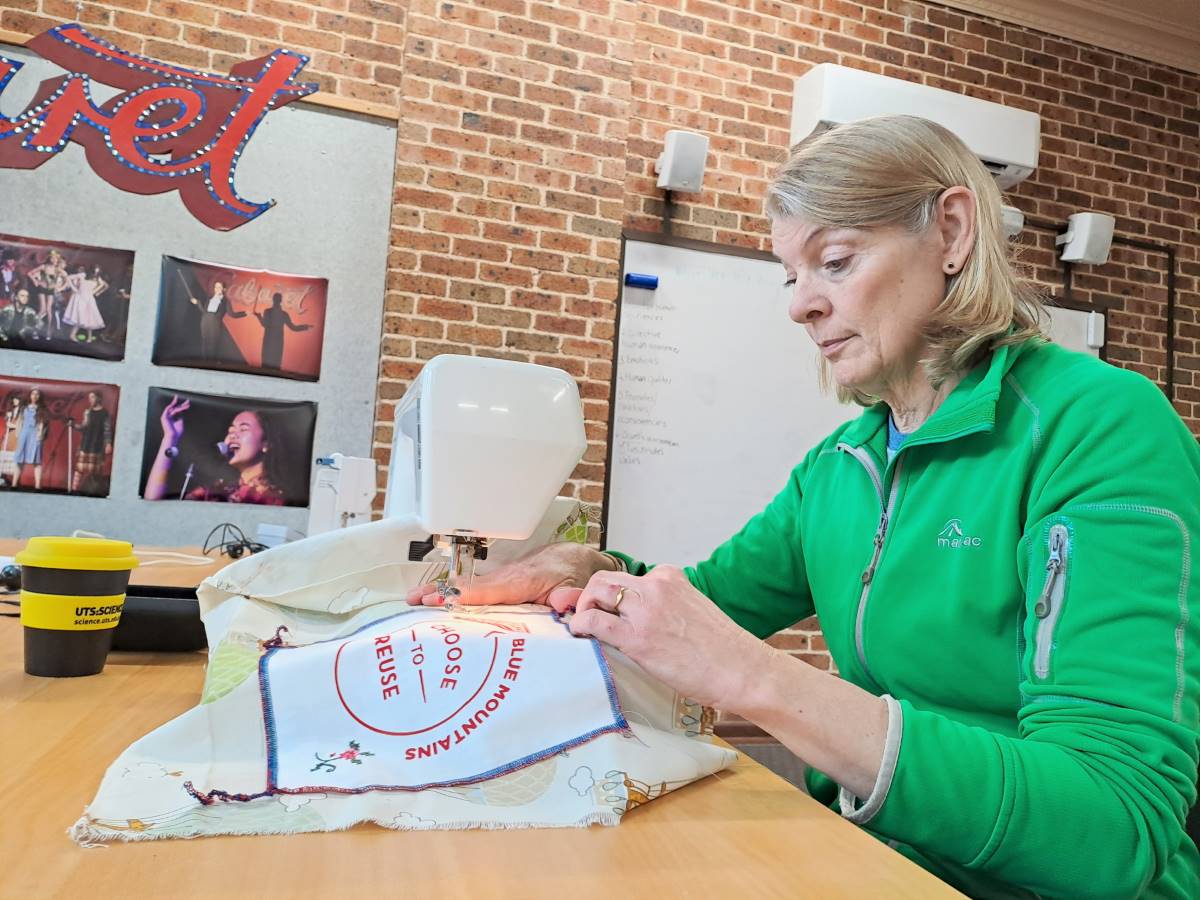
Alison sewing a label onto her bag.
The group inspires younger generations to ‘return to the old ways’ by teaching newcomers with little or no experience how to sew. Young children have even attended the group with their parents, learning a skill that will help them embrace sustainable habits and feed their creativity along the way.
“The kids wanted to learn how to sew, and without a machine at home or a clue myself, I wasn’t sure how to do this,” said Erin, who attends the sewing bees with her young daughters.
“Boomerang Bags helped us all to make a bag, and the kids are keen to come for every session. The group is welcoming and it’s lovely to be able to learn with the kids. As well as learning how to sew and doing something for the environment, we have gained some great friendships through Boomerang Bags.”

Erin and her daughter Bree learning to sew at Boomerang Bags Blue Mountains (photo supplied)
At Boomerang Bags Blue Mountains, all material has been donated by individuals or local op shops and is put to maximum use. “We get as much out of the material as we can,” said Maria. “Even if the material is threadbare, we’ll still use it by screen printing the labels on it, to minimise waste.” Leftover scraps are collected and used for filling in other projects, such as a homemade ottoman Maria is currently working on.
Most of the volunteers are so dedicated to the cause that they sew bags at home as well as during the monthly sewing bees. Often leaving small, individualised marks on their work, they find great joy in spotting their bags being used by the community. “Sometimes I find myself looking around the shops for my bags,” said Alison, “then I get really excited when I see someone using one of them.”
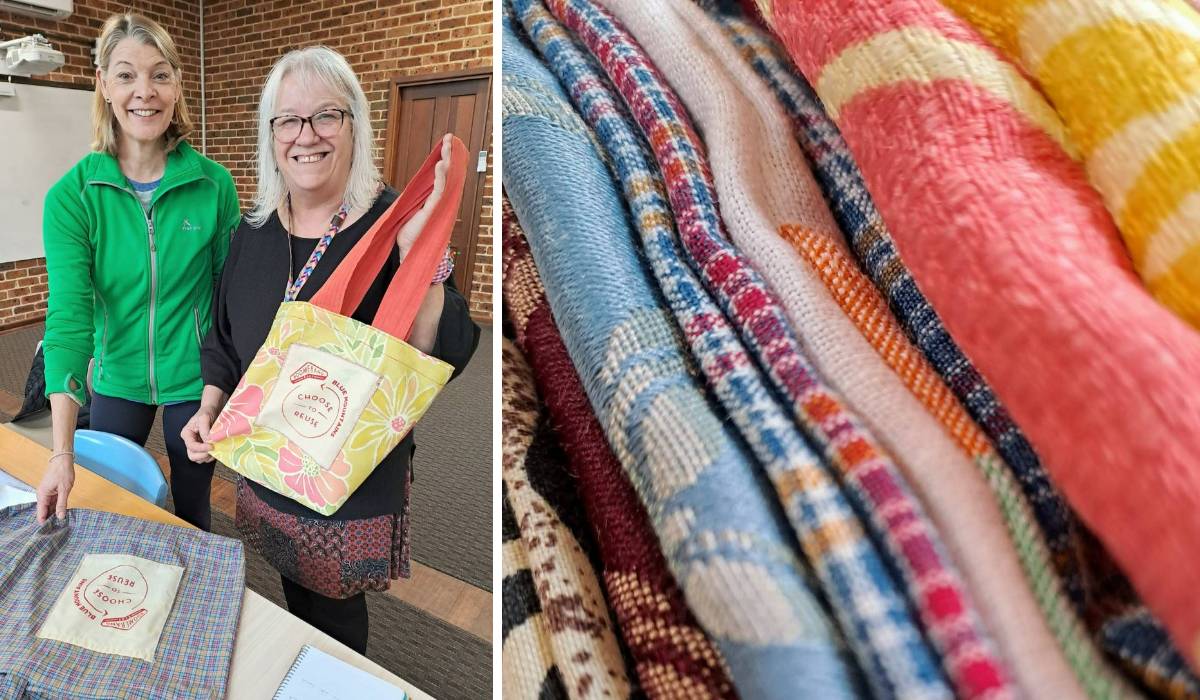
Left: Alison and Maria with their latest creations. Right: A bundle of bags ready to go out and be used (and reused).
Maria, who is also the Korowal representative for the Blue Mountains Sustainable Schools Network, was recently nominated for a Blue Mountains City Council ‘Binfluencer’ Award for her work with Boomerang Bags and her efforts in waste management as Teacher Librarian at Korowal School, where she has introduced two initiatives to reduce waste at the school: Return and Earn and Simply Cups.
She encourages the community to grab a few Boomerang Bags and use them as much as possible, donate fabric to the group, and come along to the monthly sewing bees to learn how to sew, make friends, and be part of the solution.
“Come and have a chat with me,” she said. “We’ll talk rubbish… literally.”
Take Action:
- Join the Boomerang Bag movement by participating in sewing bees at Korowal School on the first Saturday of every month.
- Donate unwanted fabric to Boomerang Bags Blue Mountains (must be the size of a pillow-case or bigger).
- Use and reuse (and reuse and reuse and reuse) Boomerang Bags to minimise associated carrier-bag impacts on the environment.
- Check out Blue Mountains City Council’s Textile Recycling Initiative
Share this article:
This story has been produced as part of a Bioregional Collaboration for Planetary Health and is supported by the Disaster Risk Reduction Fund (DRRF). The DRRF is jointly funded by the Australian and New South Wales governments.
